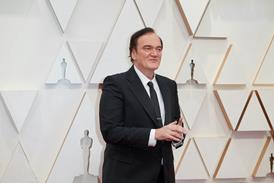French state contribution to Franco-German broadcaster ARTE to increase by 7.3 percent in 2012 to €270.2million as part of plan to bump-up audience figures and lure in younger viewers.
Arte Cinema is set to receive an extra €500,000 a year for film production over the next five years, bringing its annual budget to €9.5 million in 2012, the Paris-based outfit’s head Michel Reilhac has revealed.
“In the current economic climate I guess it appears strange that a state-backed body like Arte Cinema is getting extra funding. It’s the consequence of an overall budget increase for ARTE as part of a plan to re-launch the channel,” said Reilhac.
The Franco-German broadcaster Arte, which started broadcasting in 1992, is set to be overhauled in the coming months in a campaign spearheaded by Veronique Cayla, the former Unifrance chief who was appointed president of the state-funded channel at the end of 2010.
The broadcaster’s audience share has fallen from 3.1% in 2007 to 1.5% in 2011 amid the proliferation of digital television channels.
In a bid to reverse the trend, Cayla wants to restructure the broadcaster’s schedule, lighten the content and draw in younger audiences through three new Internet platforms dedicated to cinema, ecology and history.
At present, Arte Cinema invests in 25 feature-length productions a year including three feature-length documentaries. Reilhac stressed that the company would remain committed to independent cinema amid the changes.
“Our remit hasn’t changed. We’re still interested in smaller films as well as first and second features. We’re not scared to take on works that might be deemed as difficult and haven’t yet got a distributor,” he said. “We see this as part of our role. We also feel that by endorsing a smaller film we can sometimes give it a boost.”
Reilhac’s deputy Remi Burah, who oversees Arte Cinema’s budget, said that the extra funding would probably be invested in one feature-length animation production.
“We have decided that we would prefer to make a big investment on a bigger budget film rather than dividing the extra funding between several titles,” said Burah. “We’ve made no secret of the fact that we would like to invest in a feature-length animation and it is our hope we will be able to use the extra money to do that… we just need the right project.”
Beyond co-producing, Reilhac [pictured] said Arte Cinema would also be involved in the new platform devoted to cinema, although its development was the responsibility of Arte’s web department.
“The same programme that attracts an audience with average age of 55 on the television will attract an audience aged between 35- to 40-years-old when it is shown on the Internet. We want to tap into this,” said Reilhac. “It will be a fantastic support tool. We want to get people interacting, live-tweeting, exchanging views on forums, participating in live chats with filmmakers…”
A well-known proponent of transmedia creativity, Reilhac is hoping such interactivity will also eventually be incorporated into some of the films he co-produces.
Arte Cinema is heavily involved in pioneering transmedia film Rosa, from young, experimental director Lucile Chaufour. As well as a feature film, the project will also include an exhibition, interactive websites — through which the public can contribute to the storyline and eventually possibly appear in the feature — and a book.
“Lucile’s really secretive and doesn’t want to reveal too much, but it’s a pioneering project building a transmedia feature film from the bottom up,” said Reilhac.
Other co-productions underway include Arnaud Des Pallieres’ Michael Kohlhaas, Quebecois Xavier Dolan’s Laurence Anyways and Roy Andersson’s Pigeon on a Branch, Leos Carax’s Holly Motors and Sylvie Verheyde’s Confession of a Child of the Century, starring Pete Doherty, Charlotte Gainsbourg and Lily Cole.
In its latest round of funding at the end of September, Arte Cinema’s selection committee decided to invest in Georgian Teona Grenade’s lost generation tale Dzma and Nion Didier’s L’Hérétique, an adaptation of the late French adventurer Alain Bombard’s The Voyage of the Heretique recounting his solo trip across the Atlantic in an inflatable rubber dinghy.
Also selected was Hélène Fillière’s Les Adorés inspired by the life and notorious death of French banker Edouard Stern who died during a sadomasochistic bondage session in 2005. Starring Benoit Poelvoorde and Laetitia Casta, the film is currently shooting in Belgium and Luxembourg until the beginning of December.
- Financier: Arte Cinema




































No comments yet